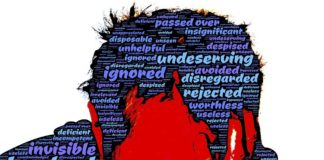Tag: stigma and mental health
Biomedical Model of Mental Illness Creates Stigma for College Students Using...
A study conducted on college-aged students finds strong correlations between biomedical characterizations of mental illness, pharmaceutical treatment, and social stigma.
The Impacts of Structural Stigma With Mark L. Hatzenbuehler
In this video for Worldview Stanford, clinical psychologist Mark L. Hatzenbuehler discusses the adverse physical and mental health outcomes that often result from structural stigma.
Psychosocial Explanations of Psychosis Reduce Stigma, Study Finds
A review of mental health anti-stigma campaigns finds psychosocial models are effective in reducing stigma, while biogenetic models often worsen attitudes.
Psych Patients Who Resist Stigma Do Better
A new study in press in the Journal of Schizophrenia Research finds that patients who actively resist the negative stigma associated with mental health...
“Transgender Veterans Have High Rates of Mental Health Problems”
A new study finds that ninety percent of military veterans who identify as transgender have at least one mental health diagnosis. “Traumatic brain injuries...
To the Heart of the Matter, Part III: The Critical Nature...
If we are going to really make a difference in the world of mental health stigma, we must get to the heart of the matter. All people deserve compassionate, honest care. All people, stigmatized and stigmatizers, deserve to be heard, understood, and valued, no matter what worth that society may place on them. I am my brother’s keeper. You are mine.
Large German Anti-Stigma Campaign Shows Little Effect on Attitudes
“Overall, this study showed that the information and awareness campaign had almost no significant effects on the general public's attitudes toward people affected by either schizophrenia or depression,” the researchers, led by German medical sociologist Anna Makowski, wrote. “One could assume that deeply rooted convictions cannot be modified by rather time-limited and general activities targeted at the public.”
To the Heart of the Matter, Part II: Perceptions of Public and...
Public perception of mental health stigma does not entirely reflect a reality that exists. Many of you reading this that have experienced truly negative reactions from others (due to mental health concerns and/or treatment) may be angered or offended by this proposition. However, no one (especially myself) is saying that stigma is not a serious concern that doesn’t need to be addressed. It is. Although in some ways I do feel that people can seek out treatment with less apprehension today than decades ago, there is no doubt that many still experience negative reactions (intentionally or unintentionally) from what others perceive in them.
Culturally Numb
Experiencing emotional pain is a necessary part of life. Emotional pain often contains valuable lessons to help us on our journeys. We need to make sure we are not numbing our hearts to those that are hurting. We need to de-stigmatize the struggles, joys and pains that come with being human. We need to not just mindlessly pursue happiness - though we might think of that as an inalienable right - and avoid pain. We need to do the only thing that brings true joy: embrace all of life and each other, as we experience together all that makes us human.
“Loneliness May Warp Our Genes, And Our Immune Systems”
NPR reports how loneliness can change our bodies and affect our physical and mental health. "There are things we can do to get out of a depressed or lonely state, but they're not easy," they report. "Part of the reason is because these negative psychological states develop some kind of molecular momentum."












